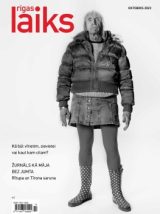Tim Ochser
was born in London and currently lives in Riga, Latvia. Works as a culture editor for the
Articles
Commissioned by British television to set up interviews for a documentary on sex trafficking in Latvia, Tim Ochser finds himself an accomplice in the simplification of the phenomenon. To call sex trafficking “modern slavery” fails to see it as the consequence of the sexualization of culture. To get to the real story, he says, the documentary should have been about the men who use women as prostitutes.
In his look at the “genuineness” of pornography, Tim Ochser finds that in many ways, life has come to imitate pornography “in an almost grotesque parody”. Rather than judging pornography as good or bad, moral or immoral, Ochser focuses on the reasons pornography exists, what purpose it serves, and the effects it has on both viewers and non-viewers.
